
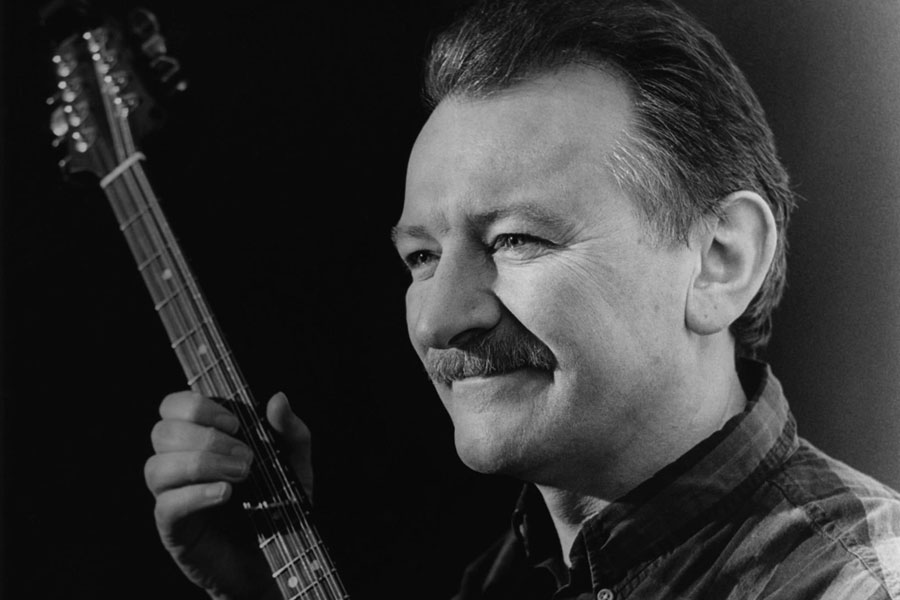
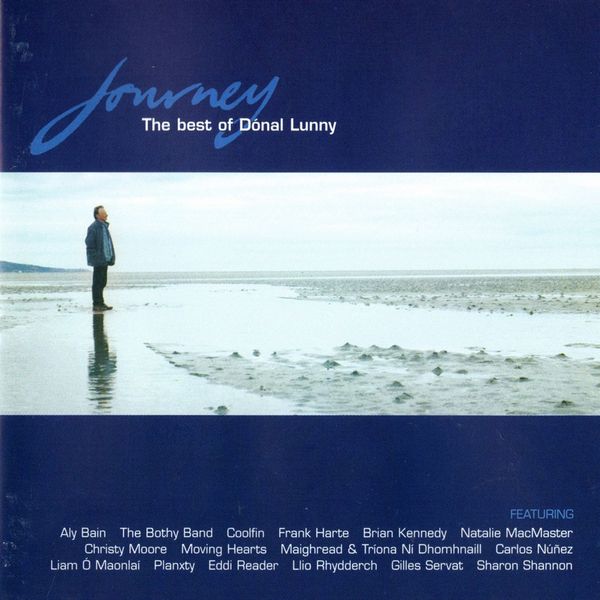 |
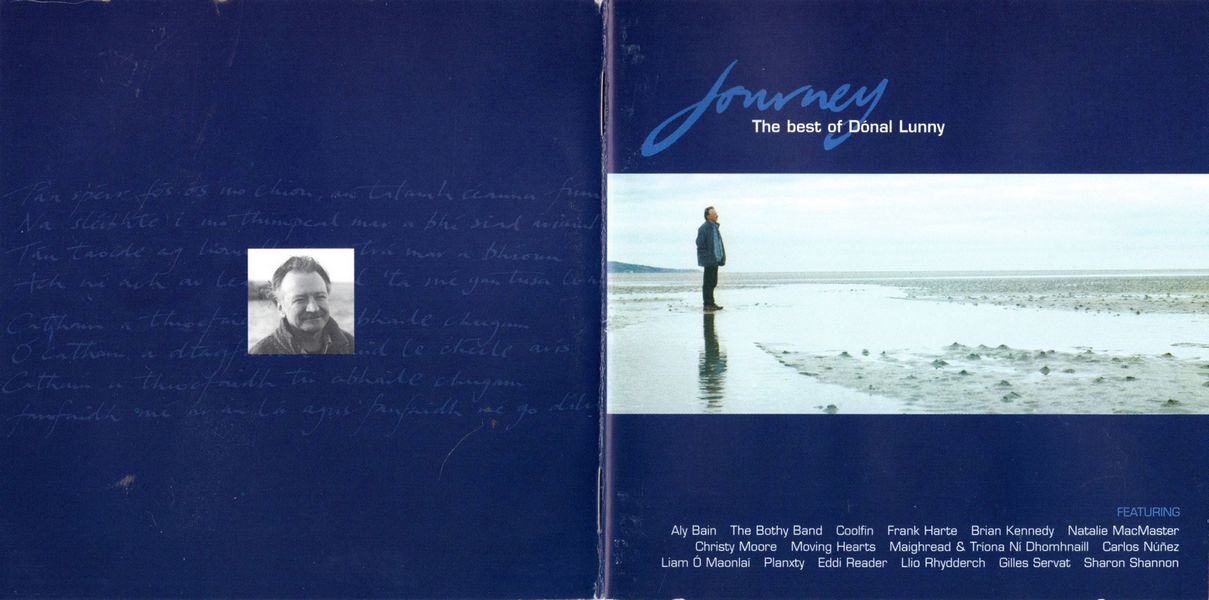
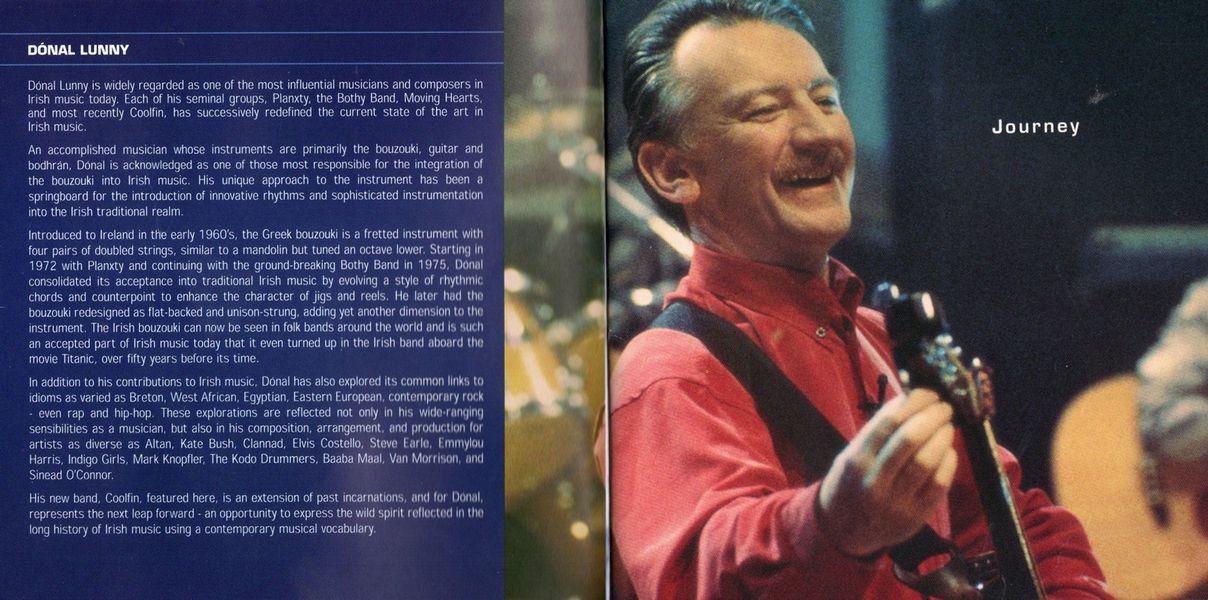 |
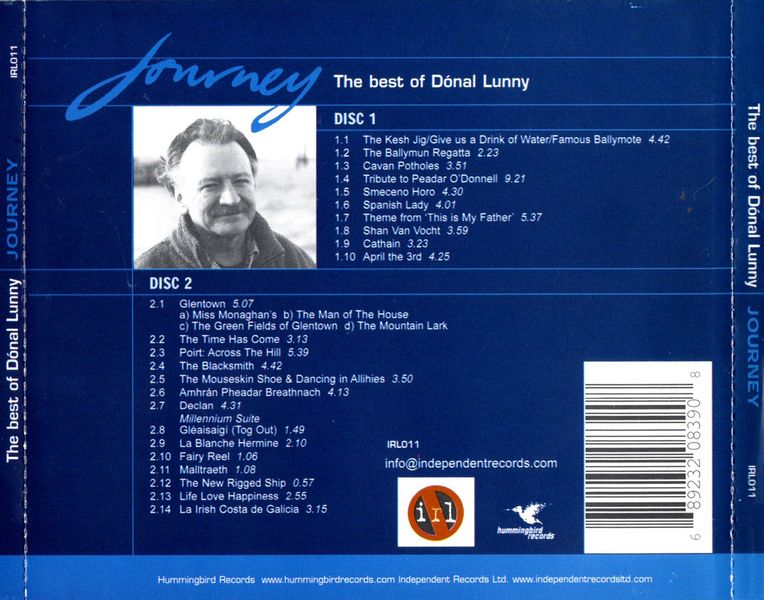
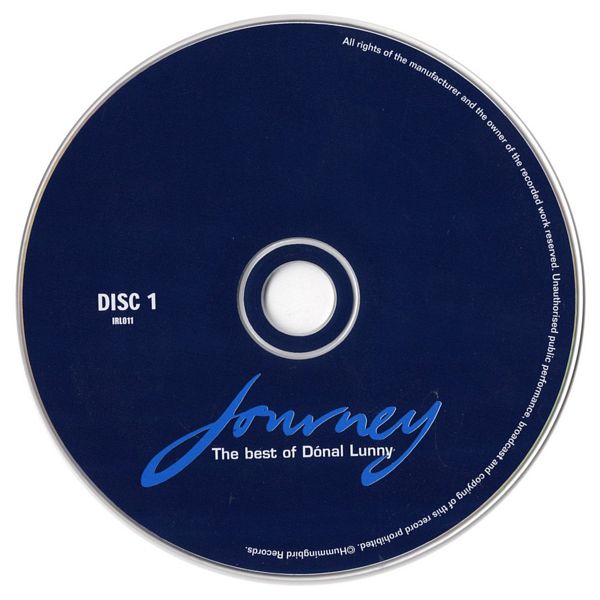
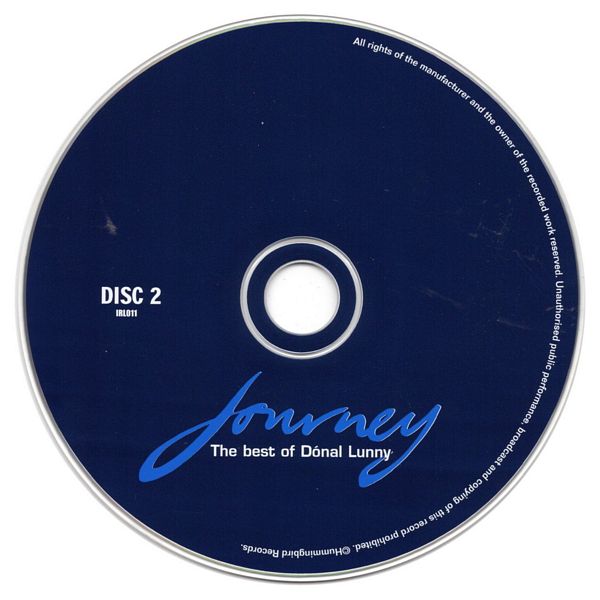
|
| more images |
Song Credits & Notes
The Kesh Jig, Give Us A Drink Of Water & Famous Ballymote — The Bothy Band
This was the opening set of the first night of a two-week concert run in 1978 in Paris, all of which was recorded for the Bothy Band's fourth and last album. This performance has a certain lightness about it, probably because none of us expected the "serious" recording to happen until later in the week The descending whistle sound on the intro was a spontaneous vocal contribution on my part, and did apparently help to get things going! The Kesh set was something of a favourite with our audiences and became a Bothy Band signature.
Matt Molloy — Flute, Paddy Keenan — Uilleann Pipes, Kevin Burke — Fiddle, Tríona Ní Dhomhnaill — Clavinet & Bodhrán, Mícheál Ó Domhnaill — Guitar, Dónal Lunny — Bouzouki
Recorded by Phillipe Omnès, Bernard Darsch & "The Doctor" at the Palais des Arts, Paris, June 1978.
Mobile studio by Devout Studios.
Taken from the Bothy Band album After Hours, Mulligan Music LUN030, 1978.
The Ballymun Regatta (from the "Timedance" Suite) — Planxty
Commissioned by RTE, "Timedance" was composed as the centrepiece for their presentation of the Eurovision Song Contest in 1981. The opening section is a traditional tune. The Humours of Barrack Street, followed by Isercleran, written by Bill Whelan. This, the final piece in the suite, is one of the first attempts I made to write a slipjig, which is in 9/8, my favourite rhythm in Irish music. "Timedance" was performed and recorded by Planxty, and subsequently released as a single. This later version was recorded in 1992 as part of another of Bill Whelan's projects, EXPO '92. As in the original, the arrangement is mostly his. apart from a low nudges from me in the percussion department.
Liam O'Flynn — Uilleann Pipes, Andy Irvine — Bouzouki & Mandolin, Nollaig Casey — Fiddle, Bill Whelan — Piano Keyboards & Keyboard percussion, Dónal Lunny — Bouzouki, Guitar & Bodhrán
Strings — The Timedance String Ensemble, Leader: Audrey Collins.
Recorded and mixed by Brian Masterson at Windmill Lane Recording Studios, 1992.
Taken from 'The Seville Suite', TARA 3030, 1992.
Cavan Potholes — with Sharon Shannon and Richie Buckley
The infectious joy in Sharon Shannon's playing comes through in this live version which was recorded during the second Sult series, presented by TG4, Ireland's Irish language TV channel. The series, produced by Philip King and featuring the original Coolfin members as the house band, was shown in two 13-week segments over two years (1996/1997) and celebrated the vitality and diversity of Irish music. This tune was written especially for Sharon — the original studio version was released on the Common Ground album (EMI 1996).
Noel Bridgeman — Percussion, Stephen Cooney — Bass, Pat Crowley — Keyboards, Nollaig Casey — Fiddle, Richie Buckley — Saxophone, Dónal Lunny — Bouzouki
Recorded for Sult 2 by Brian Masterson at Temple Bar Music Centre, Dublin, February 1997.
Mixed by Philip Begley at Beech Park Studios, Rathcoole, Co. Dublin.
Previously unreleased.
Tribute To Peadar O'Donnell — Moving Hearts
In honour of Peadar O'Donnell, who perhaps more than anyone else in the last century, improved the conditions of industrial and farm workers in Ireland. It was commissioned by the Committee for Concerned Universities' Staff at University College, Galway, and performed by Moving Hearts (this band was my baptism by fire in the realm of bass, drums, percussion, etc., a severe learning curve. The combination of jazz, rock, and traditional influences made for a challenging musical brew). Featured is the playing of Uilleann pipe virtuoso Davy Spillane. An edited version of this recording was previously released on Celtic Odyssey, The Narada Collection Series, 1993. This longer version was first released on the Moving Hearts' album The Storm.
Davy Spillane — Uilleann Pipes & Low Whistle, Declan Masterson — Uilleann Pipes, Keith Donald — Soprano & Alto Saxophone, Noel Eccles — Percussion, Matt Kelleghan — Drums, Eoghan O'Neill — Bass, Greg Boland — Guitar, Dónal Lunny — Bouzouki, Synthesiser & Bodhrán
Recorded by Andrew Boland at Eerie Mobile Studio. Dublin.
Mixed at Windmill Lane Studios, Dublin, 1985.
Taken from Moving Hearts, The Storm, TARA 3014, 1985.
Smeceno Horo — Planxty
Andy Irvine's love of Eastern European music was an important element in the music of Planxty and fed my own interest in eccentric time signatures. This dance tune in 9/16 time was collected by him in the 1970's on one of his many trips to Bulgaria.
Christy Moore — Bodhrán, Andy Irvine — Bouzouki, Mandolin & Mandola, Liam O'Flynn — Uilleann Pipes & Whistles, Matt Molloy — Flute, Dónal Lunny — 10 String Bouzouki
Recorded and mixed by Brian Masterson at Windmill Lane Recording Studios, 1979.
Taken from Planxty, After the Break, TARA 3001, 1979.
Spanish Lady — with Maighread and Tríona Ní Dhomhnaill
Essentially a Dublin song. Spanish Lady has gone through many changes over the years, as is the way with most traditional songs. It has a directness characteristic of the Dublin ballad and is refreshingly free from ornamentation and sentimentality. This rendition is a combination of several versions. Maighread got it from Frank Harte, who has put together possibly the largest and most important collection of songs in Ireland.
Maighréad Ní Dhomhnaill — Vocals, Tríona Ní Dhomhnaill — Vocals & Keyboards, Máire Breatnach — Fiddle, Sharon Shannon — Accordion, Lloyd Byrne — Percussion, Dónal Lunny — Bouzouki, Bodhrán, Bass Guitar & Synth
Recorded by Philip Begley, and assisted by Richard McCullough at the Fort, Roundstone, Co. Galway, 1999.
Taken from Maighread & Tríona Ní Dhomhnaill, Idir an Dá Sholas, Gael Linn/Hummingbird GLH 9002, 1999.
Theme from "This is My Father"
This unconventional, sensitive film was the result of an unusual collaboration between three brothers, Declan, Paul and Aidan Quinn, each of whom is greatly respected in the world of cinema. The story was set in both the past and the present, and reflected my own involvement in traditional and contemporary music.
Sharon Shannon — Accordion, Nollaig Casey — Fiddle, John McSherry — Whistles, Graham Henderson — Keyboards, Oisín Lunny — Programming & Beats, Dónal Lunny — Bouzouki & Bodhrán
Recorded by Tim Martin at Totally Wired, Dublin and Real World Studios, Bath, England, 1999.
Taken from This is My Father — Original Soundtrack. Hummingbird HB0019, 1999.
Shan Van Vocht ("Poor Old Woman") — with Frank Harte
The "poor old woman" is the personification of Ireland, who has had many different guises in song and verse, such as Caitlín Ni hUallacháin and Cait Ní Dhuibhir. In this version, she holds forth on the hoped-for arrival of the French forces, to assist the United Irishmen in the rebellion of 1798. This track was featured on an album Frank and I recorded to commemorate the bicentennial of that turbulent year.
Frank Harte — Vocal, Dónal Lunny — Bouzouki & Bodhrán
Recorded by Ciarán Byrne at Marguerite Studios, Dublin, 1998.
Taken from Frank Harte & Dónal Lunny, 1798 - The First Year Of Liberty. Hummingbird HB0014, 1998.
Cathain ("When?") — with Liam Ó Maonlaí
Written by Rónán Ó Snodaigh of Kila, an adventurous Dublin band who use the Irish language in an effortlessly contemporary way. Liam Ó Maonlaí, of Hothouse Flowers, as brilliant as ever, lends his own raw and driving style to this haunting song that is somehow both primitive and contemporary. Also recorded as a part of the Sult series, and originally released on the
Common Ground album (EMI 1996).
Stephen Cooney — Didgeridoo, Mel Mercier — Bodhrán, Liam Ó Maonlaí — Vocals & Bodhrán, Nollaig Casey — Fiddle, Pat Crowley — Keyboards, Dónal Lunny — Bodhrán
Recorded for Sult 1 by Brian Masterson at Temple Bar Music Centre, Dublin, February 1996.
Mixed by Philip Begley at Beech Park Studios, Rathcoole, Co. Dublin.
Previously unreleased.
April The 3rd
This new dance tune was written as the theme music for the Bringing It All Back Home project, which featured an extraordinary assemblage of Irish-American singers and musicians. Originally begun in collaboration with the Edge from U2. this piece mixes the old rhythms of Irish dance music with modern rhythmic and percussive elements. It was named for the day on which it was written in 1990.
Hassam Ramzy — Percussion, Noel Eccles — Percussion, Paul Moran — Percussion, Tony Molloy — Bass, A.N. O'Ther — Electric Guitar, Anto Drennan — Electric Guitar, Nollaig Casey — Fiddle, Rónán Browne — Uilleann Pipes, James Delaney — Keyboards, Dónal Lunny — Bouzouki & Bodhrán
Recorded by Andrew Boland at Ringsend Road Studios, Dublin, April 1990.
Taken from Bringing It All Back Home. Hummingbird HB0010, 1991.
Glentown — Coolfin with guests
The collective name for this set of reels comes from the third tune. The Green Fields of Glentown, written by the great fiddler Tommy Peoples, one-time Bothy Band member. The four fiddles in this recording, led by Nollaig Casey, bring out the wildness and power of this wonderful reel, which was also performed at the Seán Ó Riada Retrospective concert in 1987.
Coolfin: Ray Fean — Drums, Roy Dodds — Percussion, Fionn O'Lochlainn — Bass, Graham Henderson — Keyboards, Nollaig Casey — Fiddle, Mairéad Nesbitt — Fiddle, John McSherry — Uilleann Pipes, Dónal Lunny — Bouzouki
Guests: Máire Breatnach — Fiddle, Seán Smyth — Fiddle
Recorded and mixed by Tim Martin at Real World Studios, Bath, England, September-November 1997.
Taken from Dónal Lunny, Coolfin. Hummingbird/EMI HBRTE 221, 1998.
The Time Has Come — with Christy Moore
Christy Moore and I wrote this gentle song, originally released as a single (WEA 1983), during the infamous hunger strikes by Irish Republican prisoners in the Maze prison, Belfast, in 1983. It imagines a dialogue between one of the dying men and his mother, and highlights the poignancy of their struggle. Other songs on the same subject, of which Moving Hearts had several, were much more strident and outspoken, and never made it past the broadcasting censors. However, this one slipped through, and was aired for several weeks by RTE who presumably took it for just another sentimental love song.
Christy Moore — Vocals & Guitar, Dónal Lunny — Bouzouki
Recorded by Leon O'Neill on minidisc at Ddnal's home, Dublin, February 2000.
Mastered by Philip Begley at Quill's, Dublin, Ireland.
Poirt: Across The Hill — Dónal Lunny with guests
A live recording, featuring a one-off combination of players, made on the second night of the Seán Ó Riada Retrospective weekend. The event was a celebration of Seán Ó Riada's powerful influence on the course of Irish music. In the early 1960's he founded Ceoltóirí Cualann, an ensemble of brilliant traditional musicians, after which the world of Irish music would never again be the same. Across The Hill is followed by a classic traditional piping tune, The Gold Ring.
Nollaig Casey — Fiddle & Viola, Seán Óg Potts — Uilleann Pipes & Keyboards, Cormac Breathnach — Flute, Arty McGlynn — Guitar, Manus Lunny — Bouzouki, Steve White — Percussion, Damien Quinn — Bodhrán, Dónal Lunny — Bouzouki & Keyboards
Recorded and mixed by Brian Masterson at the National Concert Hall, Dublin, April 1987.
Taken from Dónal Lunny, Dónal Lunny, Gael Linn CEF 133, 1987.
The Blacksmith — Coolfin with Eddi Reader
My first encounter with this ancient song was when Andy Irvine brought it into the Planxty repertoire. Recorded for the Sult series, Eddi Reader's interpretation is deceptively subtle, as she moves between major and minor, seventh and flattened seventh, against a deliberately ambiguous background. Eddi also lent her rare talent to the Coolfin album with her version of The Lowlands of Holland — she remains one of my favourite singers.
Coolfin: Ray Fean — Drums, Roy Dodds — Percussion, Fionn O'Lochlainn — Bass, Graham Henderson — Keyboards, Nollaig Casey — Fiddle, Mairéad Nesbitt — Fiddle, John McSherry — Uilleann Pipes, Dónal Lunny — Bouzouki
Recorded for Sult 2 by Brian Masterson at Temple Bar Music Centre, Dublin, February 1997.
Mixed by Philip Begley at Beech Park Studios, Rathcoole, Co. Dublin.
Previously unreleased.
The Mouseskin Shoe & Dancing In Allihies — Coolfin
Nollaig Casey's family comes from Allihies in West Cork, and this tune relates to a story her father told her: around a century ago a tiny shoe was found on the side of a hill in Allihies. Complete in every respect: metal eyelets, fine stitching... it was about an inch long, and was sent to Princeton University for examination. There it was discovered that the shoe was made of mouseskin, and furthermore, had marks of wear and tear on the sole, indicating that someone of impossibly small stature had been wearing it!
Coolfin: Ray Fean — Drums, Roy Dodds — Percussion, Fionn O'Lochlainn — Bass, Graham Henderson — Keyboards, Nollaig Casey — Fiddle, Mairéad Nesbitt — Fiddle, John McSherry — Uilleann Pipes, Dónal Lunny — Bouzouki
Recorded and mixed by Tim Martin at Real World Studios, Bath, England, September-November 1997.
Taken from Dónal Lunny, Coolfin, Hummingbird/EMI HBRTE 221, 1998.
Amhrán Pheadar Breathnach ("Song of Peter Walsh") — with Maighréad Ní Dhomhnaill
This song was written by Peadar Breathnach, a poet from Glenfinn in Co. Donegal who flourished in the middle of the 19th century. Many of his songs are still widely sung in the Donegal Gaeltacht (Irish speaking area). In this song, Peadar tells of a spree where he ended up on Aran Mór Island, off the coast of Donegal, in the company of a young woman who was more than a match for his wit (and drinking ability!). The words of the song come from Maighread's aunt Neili, and the tune, which is a variation on the one normally associated with the song, comes from a recording made by Professor Doegen, a German linguist who recorded Irish songs in the late 1920's.
Vocals — Maighréad Ní Dhomhnaill, Dónal Lunny — Bouzouki, Mandolin, Bodhrán, Keyboards
Recorded and mixed by Philip Begley at Park Studios, Dublin, 1991.
Taken from Maighréad Ní Dhomhnaill, Gan Dha Phingin Spré — No Dowry, Gael Linn CEF 152, 1991.
The Mouseskin Shoe & Dancing In Allihies — Coolfin
Nollaig Casey's family comes from Allihies in West Cork, and this tune relates to a story her father told her: around a century ago a tiny shoe was found on the side of a hill in Allihies. Complete in every respect: metal eyelets, fine stitching... it was about an inch long, and was sent to Princeton University for examination. There it was discovered that the shoe was made of mouseskin, and furthermore, had marks of wear and tear on the sole, indicating that someone of impossibly small stature had been wearing it!
Coolfin: Ray Fean — Drums, Roy Dodds — Percussion, Fionn O'Lochlainn — Bass, Graham Henderson — Keyboards, Nollaig Casey — Fiddle, Mairéad Nesbitt — Fiddle, John McSherry — Uilleann Pipes, Dónal Lunny — Bouzouki
Recorded and mixed by Tim Martin at Real World Studios, Bath, England, September-November 1997.
Taken from Dónal Lunny, Coolfin, Hummingbird/EMI HBRTE 221, 1998.
Declan — Dónal Lunny with guests
A commemoration of the much-loved Dublin musician. Declan McNelis, who died tragically on the 13th of April, 1987. This is a live recording of its debut performance during the second of the Seán Ó Riada Retrospective concerts. Guitarist Jeff Beck recently recorded a version of this composition on his 1999 album Who Else? (Epic/Sony).
Nollaig Casey — Fiddle & Viola, Seán Óg Potts — Uilleann Pipes & Keyboards, Cormac Breathnach — Flute, Arty McGlynn — Guitar, Manus Lunny — Bouzouki, Steve White — Percussion, Damien Quinn — Bodhrán, Dónal Lunny — Bouzouki & Keyboards
Recorded and mixed by Brian Masterson at the National Concert Hall, Dublin, April 1987.
Taken from Dónal Lunny, Dónal Lunny, Gael Linn CEF 133, 1987.
Millennium Suite — Coolfin with guests
Coolfin: Ray Fean — Drums, Lloyd Byrne — Percussion, Ronnie O' Flynn — Bass, Graham Henderson — Keyboards, Nollaig Casey — Fiddle & Viola, John McSherry — Whistles & Uilleann Pipes, Dónal Lunny — Bouzouki, Bodhrán & Guitar
Commissioned by RTE (Radio Telefis Éireann), the performance of this piece was broadcast world-wide from Dublin via BBC TV on the 31st of December, 1999, and features a sampling of the wide spectrum of musical styles to be found in the Celtic countries and regions of Europe and Canada, including contributions from some of their best-known artists. In hopes of capturing the festivity and celebration of that rare New Year's Eve, I wrote the opening reel. Gléasaigí ("Tog Out").
Recorded and mixed by Philip Begley at Beech Park Studios, Rathcoole, Co. Dublin, November and December 1999.
Previously unreleased